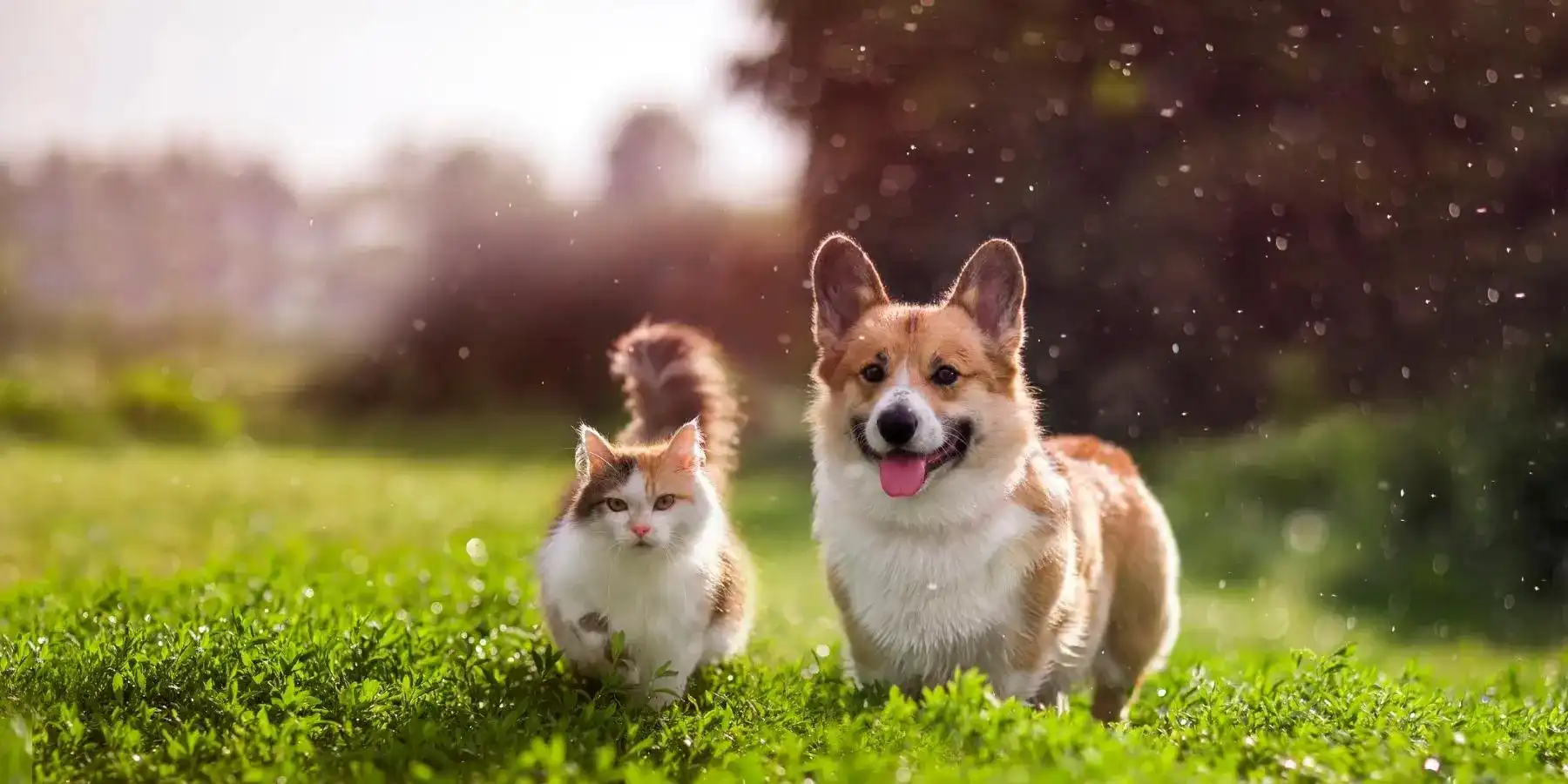PET CARE
Pets in Spring: 6 Hazards & Safety Tips
Winter has broken, and it’s finally spring! Pets and humans alike are itching to get outside after a long winter hibernation, but each season brings its own unique hazards — and spring is no different. Let’s take a look at six springtime pet hazards, as well as useful safety tips to help you and your pet get the most out of the season!
1. Beware of Easter Baskets
Let’s start with the first major spring holiday. Easter baskets, while great for kids and adults alike, can pose a threat to your pets. Chocolate, in particular, is toxic to dogs and cats. Chocolate toxicity has several recognizable symptoms, including:
Other types of candy may contain xylitol, an artificial sweetener that can be toxic to pets — especially if they’re diabetic. If you suspect your pet has raided the candy stash, call your vet immediately.
In addition, the plastic grass that’s widely used in baskets can be irresistible to cats. When eaten, this grass can become entangled in the kitty’s digestive tract and could require surgery to remove. Keep grass, ribbon, bows, and other enticements out of paws’ reach.
2. Avoid Toxic Flowers and Plants
Lilies and other spring flowers and plants can be especially fatal to cats who enjoy adding fiber to their diet. Amaryllis, chrysanthemums, and even tulips are highly toxic to cats in particular and should be kept away from indoor cats and highly protected from outdoor kitties.1,2,3
3. Take Care With Cleaning Chemicals
Spring cleaning! Throw open those windows, put on some music, and wash away the winter. But keep your supplies safely away from the resident pets. Commercial cleaning products contain many chemicals that are toxic to dogs and cats. Fastidious felines and curious canines can pick up trace amounts of these chemicals on their paws and ingest them while self-grooming, so keep them off freshly scrubbed counters or floors until completely dry. You may also consider asking your vet about pet-safe alternatives.
Accidents Happen, Pet Insurance Can Help
4. Manage Springtime Pet Allergies
Just like us, our furry friends can be allergic to plants and pollens that make springtime beautiful. Some allergies in dogs and sensitive cats can trigger potentially fatal anaphylactic shock. Watch for signs, including:
- Labored breathing
- Frantic and repeated scratching
- Licking
- Biting at the skin or paws
- Inflammation in the ears
If you observe these symptoms, call your vet. Many pet allergies can be treated with over-the-counter (OTC) medications, but you should always consult your vet before treating at home.
5. Watch Out for Parasites
With warm weather comes the return of fleas, ticks, and other creepy crawlers that can’t wait to latch onto your cat or dog. These, in turn, can transmit illnesses — like giardia and Lyme disease — to your pet. The best way to keep your pet safe from parasites and the diseases they carry? Prevention!
Work with your vet to select the best flea, tick, and parasite prevention method for your pet. Some topical solutions are extremely effective at killing fleas once they’ve bitten your pet, but others also repel fleas before they even bite. In addition, you can spritz your pet with a solution of water and fresh citrus juice (orange or lemon work well) for a little extra repellent armor, as fleas in particular avoid citrus scents.4
6. Beware of Springtime Pet Injuries
Spring presents an opportunity to spend more time outdoors with your pet, but this can also increase the risk of injury. Encounters with other animals could result in bite wounds, and insects — like bees — can cause problems for inquisitive pets. Running through a park could also lead to cruciate ligament ruptures, in which the ligaments of the knee joint tear.4 Many dogs will require surgery to treat a torn cruciate ligament. The risk of injury is even greater if your dog already suffers from a condition like patellar luxation.
Short of keeping your dog locked up at home (which no pet parent wants to do), one of the best ways to help you prepare for potential injuries is dog insurance or cat insurance. A MetLife Pet policy could help cover some of the cost of treatment, but it’s important to get insurance before the accidents happen. Otherwise, they could become pre-existing conditions.
Pet insurance could also reimburse6 you for the cost of treating any of the other hazards discussed above. Learn more about how MetLife Pet Insurance works. Then, kick off springtime right with a free quote!
Help Keep Your Pet Healthy and Happy
Dr. Hunter Finn has been paid by MetLife to discuss the importance of choosing pet insurance. He is an integrative veterinary expert first, and social media star second. He owns Pet Method in McKinney, Texas, where he cares for pets while prioritizing their emotional well-being. When he’s not at his clinic, he’s starring in viral videos on TikTok (2 million followers) and Instagram (500K followers) — where he’s been known to snuggle puppies and conquer the latest dance trends.



